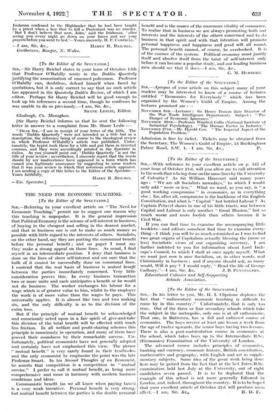[To the Editor of the SPECTATOR.] Sin,—In his letter to
you, Mr. II. I. Clipstonc deplores the fact that " rudimentary economic teaching is difficult to come by in this country." Unfortunately, that is only too true. Out of the three or four secondary schools which take the subject in the metropolis, only one is at all enthusiastic. That one, in Battersea, has a full and unbiased course of economics. The boys receive at least one lesson a week from the age of twelve upwards, the senior boys having two lessons. There is also a post-matriculation course in economics at the school, which takes boys up to the Intermediate B.Sc. (Economics) Examination of the University of London.
The advanced course includes principles of economics, banking and currency, economic history, British constitution, mathematics and geography, with English and art as supple- mentary subjects. Some idea of the great work being done here may be gained from the fact that at the last Inter. B.Sc. examination, held laSt July at the University, out of eight candidates seven passed. It is to be deplored that the example of this school is not more generally followed in London, and, indeed, throughout the country. It is to be hoped that your excellent article of October 21st will produce some






































 Previous page
Previous page